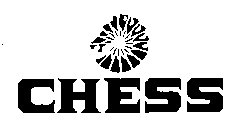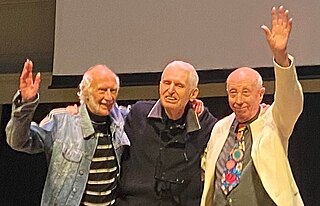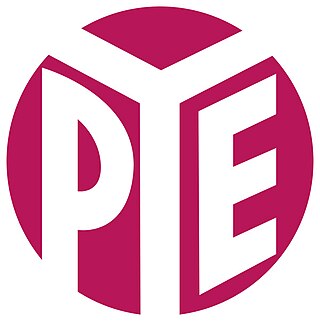
Chess Records was an American record company established in 1950 in Chicago, specializing in blues and rhythm and blues. It was the successor to Aristocrat Records, founded in 1947. It expanded into soul music, gospel music, early rock and roll, and jazz and comedy recordings, released on the Chess and its subsidiary labels Checker and Argo/Cadet. The Chess catalogue is owned by Universal Music Group and managed by Geffen Records and Universal Music Enterprises.

The Scaffold are a comedy, poetry and music trio from Liverpool, England, consisting of musical performer Mike McGear, poet Roger McGough and comic entertainer John Gorman. They are perhaps most notable for their successful singles "Thank U Very Much" (1967) and the UK number 1 "Lily the Pink" (1968). Since initially disbanding in 1977, the group have occasionally re-formed for performances and projects.

Desmond Dekker was a Jamaican ska, rocksteady and reggae singer-songwriter and musician. Together with his backing group the Aces, he had one of the earliest international reggae hits with "Israelites" (1968). Other hits include "007 " (1967), "It Mek" (1969) and "You Can Get It If You Really Want" (1970).

PYE or Pye Records is an independent British record label. It was first established in 1955 and played a major role in shaping rock 'n' roll and pop music history. The Pye name was dropped in 1980 due to trademark issues, after which it produced almost no music until the company name and trademark was acquired by the Scottish broadcaster and music producer, Tony Currie, in September 2024.
Bizarre Records, self-identified simply as Bizarre, was a production company and record label formed for artists discovered by rock musician Frank Zappa and his business partner/manager Herb Cohen.

Buddah Records was an American record label founded in 1967 in New York City. The label was born out of Kama Sutra Records, an MGM Records-distributed label, which remained a key imprint following Buddah's founding. Buddah handled a variety of music genres, including bubblegum pop, folk rock (Melanie), experimental music, and soul.

Charisma Records was a British record label founded in 1969 by former journalist Tony Stratton Smith. He had previously acted as manager for rock bands such as The Nice, the Bonzo Dog Band and Van der Graaf Generator. Gail Colson was label manager and joint managing director.

Jet Records was a British record label started by Don Arden in 1974, featuring musicians such as Lynsey de Paul, Electric Light Orchestra (ELO), Roy Wood, Gary Moore, Ozzy Osbourne, Alan Price, Adrian Gurvitz, Riot, Magnum and Trickster.

Ten Man Mop or Mr. Reservoir Butler Rides Again is the third album by Steeleye Span, recorded in September 1971. It was issued on the short-lived Pegasus label, and then the Mooncrest label, also in 1971. It was not initially issued in the US until Chrysalis acquired the group's first three albums in 1975, when it reissued all three in the UK and US. Tracks like "Four Nights Drunk", "Marrowbones", and "Wee Weaver" are essentially pure folk. It was the last album to feature founding member Ashley Hutchings; he left the band in November 1971, just after its completion, partly because he felt that the album had moved too far toward Irish music and away from English music. The band was also considering touring America, and Hutchings was reluctant to make the trip.
Rupert Lloyd Edwards is a Jamaican reggae singer and record producer.
Jack the Lad were a British folk rock group from North East England formed in 1973 by three former members of the most successful band of the period from the region, Lindisfarne. They moved from the progressive folk rock of Lindisfarne into much more traditional territory and were in the mid-1970s something of a northern counterpart to bands like Fairport Convention. They have also been seen as part of an important roots movement, rediscovering traditional Northumbrian music.
The Pioneers are a Jamaican reggae, soul and rocksteady vocal trio, whose main period of success was in the 1960s. The trio has had different line-ups, and still occasionally performs.
Bell Records was an American record label founded in 1952 in New York City by Arthur Shimkin, the owner of the children's record label Golden Records, and initially a unit of Pocket Books, after the rights to the name were acquired from Benny Bell who used the Bell name to issue risque novelty records. A British branch was also active in the 1960s and 1970s. Bell Records was shut down in late 1974, and its assets were transferred to Columbia Pictures' new label, Arista Records.
RCA Camden was a budget record label of RCA Victor, originally created in 1953 to reissue recordings from earlier 78rpm releases. The label was named "Camden", after Camden, New Jersey where the offices, factories and studios of RCA Victor and its predecessor, the Victor Talking Machine Company had been located since 1901.
String Driven Thing are a Scottish folk rock band, formed in Glasgow in 1967 and led by married couple Chris and Pauline Adams, with the electric violin of Graham Smith.

Dandy Livingstone is a British-Jamaican ska, rocksteady, and reggae musician and record producer, best known for his 1972 hit, "Suzanne Beware of the Devil", and for his song, "Rudy, A Message to You", which was later a cover hit for The Specials. "Suzanne Beware of the Devil", reached number 14 on the UK Singles Chart and number 78 in Australia. In the early 1960s, Livingstone recorded some of the bestselling UK-produced ska singles of the era.

The Monkees' discography spans over 50 years, from the release of their first single, "Last Train to Clarksville" in August 1966 to their final live album The Mike and Micky Show in April 2020. Their discography is complicated due to the large volume of unique releases in many international markets, the release of many recordings not credited to the Monkees for lack of rights to the trademark, and the existence of many bootleg, promotional, and novelty recordings that are beyond the scope of this article.
The Cimarons are a British reggae band formed in 1967. They were the UK's first self-contained indigenous reggae band.

Atomic Rooster are a British rock band originally formed by members of The Crazy World of Arthur Brown, organist Vincent Crane and drummer Carl Palmer. Their history is defined by two periods: the early-mid-1970s and the early 1980s. The band went through radical style changes, but they are best known for the hard, progressive rock sound of their hit singles, "Tomorrow Night" and "Devil's Answer", both in 1971.
This is an Atlantic Records Discography, albums released on the Atlantic Records label from its founding up until 1982, ordered by catalog number. Two of the major series of LP recordings were the "1200" and "8000" series, started by Nesuhi Ertegun. The "1200" series was reserved for jazz albums. The "8000" and subsequent series, started shortly after the 1200 in 1956, featured Atlantic's R&B and pop albums; when the "1200" series was discontinued in the 1970s, the jazz albums were mixed with the R&B and pop albums in their respective series. This list includes albums using Atlantic's numbering system that were released under their numerous subsidiary labels. There is a section containing albums related to the label as well.










